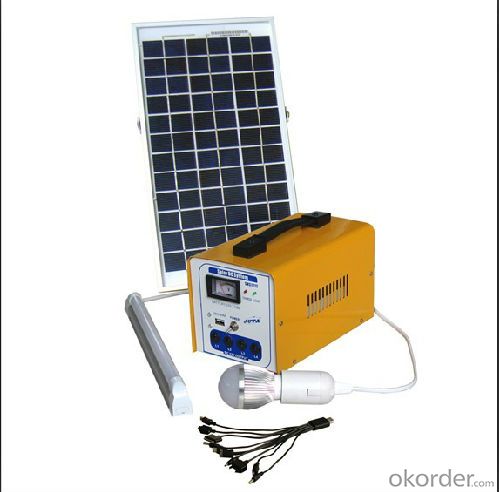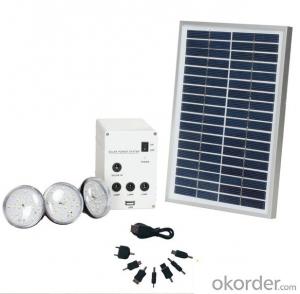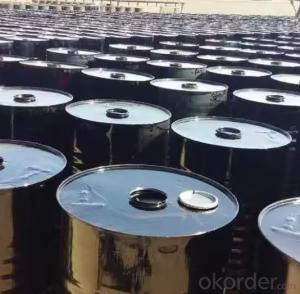Mini Home Solar System with LED Bulbs and Mobile Charger 2W 3W 5W 10W 20W 50W 100W
- Loading Port:
- Shanghai
- Payment Terms:
- TT or LC
- Min Order Qty:
- 2 watt
- Supply Capability:
- 100000 watt/month
OKorder Service Pledge
OKorder Financial Service
You Might Also Like
| Quick Details | |||||
| Specification: | Normal | Application: | Home | Output Voltage (V): | 12V |
| Load Power (W): | 24W | Solar Power (W): | 5W | Work Time (h): | 8月10日 |
| Max. voltage of solar panel to bear: | 24V | Max. conversion efficiency: | 0.8 | Max. output power: | 24W |
| Max. discharging current: | 2A | Max. charging current: | 2A | Output voltage: | 12V |
| Input voltage: | 12V | Usage: | indoor, home use,solar power system, solar home lighting system | ||
| Packaging & Delivery | |||||
| Packaging Detail: | Quantity of carton :3pcs Color Box size: 28.5*11.5*487.5px , 2.66kg/pc Carton size: 36.5*31*575px G.W/N.W: 8.7/8.0 kg | ||||
| Delivery Detail: | 25 working days according to order quantity |
| Specifications |
| 1. mini home solar system |
| 2. solar panel:18V,5W |
| 3. LED: DC12V,20LED,1W |
| 4. battery:Lead acid ,12V,4Ah |
| 5. time: 8-10Hours |
Usage:
Mini solar home lighting system, for indoor and home lighting usage.
| Specifications |
| 1. mini home solar system |
| 2. solar panel:18V,5W |
| 3. LED: DC12V,20LED,1W |
| 4. battery:Lead acid ,12V,4Ah |
| 5. time: 8-10Hours |

| Advantages: |
| 1.Solar Energy&green energy. |
| 2. Easy to install, operate and maintain. |
| 3. Ideal lighting products where normal electric is not convenient. |
| Packing details: |
| Quantity of carton :3pcs |
| Color Box size: 28.5*11.5*487.5px , |
| 2.66kg/pc |
| Carton size: 36.5*31*575px |
| G.W/N.W: 8.7/8.0 kg |
Our services:
1. Sample: Sample is available. Please send us email about your detail consignee information: name, address, zip code and tel. Then we will contact you and send samples to you.
2. Small order: We can accept small order for this product. Please let us know your order quantity.
3. Customize: We accept OEM service and can customize products as customers' design.
4. After-sales service: We will give customers active feedback within 24hours after receive any of customers' questions.
FAQ
We have organized several common questions for our clients,may help you sincerely:
①what price for each watt?
it depends on the quantity, delivery date and payment terms,
②what is your size for each module? can you tell me the parameter of your module?
we have different series of panels in different output, both c-si and a-si. please take the specification sheet for your reference.
③Can you provide the peripheral products of the solar panels, such as the battery, controller, and inverter? If so, can you tell me how do they match each other?
Yes, we can, we have two companies for solar region, one is CNBM International, the other is CNBM engineering Co.
We can provide you not only the solar module but also Solar Cells, the off grid solar system, we can also provide you service with on grid plant.
④What is your warranty system?
Our product performance guarantees for 25 years
• 12 years guarantee for workmanship
• Timeliness of delivery
• Quality Products certified (TÜV, UL, CE, ISO)
⑤How do you pack your products?
We have rich experience on how to pack the panels to make sure the safety on shipment when it arrives at the destination.
⑥ Can you do OEM for us?
Yes, we can.
⑦How long can we receive the product after purchase?
In the purchase of product within three working days, We will arrange the factory delivery as soon as possible. The pecific time of receiving is related to the state and position of customers. Commonly 7 to 10 working days can be served.
- Q:Can solar energy systems be used in areas with limited access to solar energy warranties and guarantees?
- Yes, solar energy systems can still be used in areas with limited access to solar energy warranties and guarantees. While warranties and guarantees provide added assurance and protection, the functionality and performance of solar energy systems largely depend on the availability of sunlight. Even in areas with limited access to sunlight, solar energy systems can still generate electricity, although their efficiency and output may be reduced. It is important to consider factors such as the amount of available sunlight, system design, and energy storage options to ensure optimal system performance in areas with limited solar energy warranties and guarantees.
- Q:How do solar energy systems affect the reliability of the electrical grid?
- Solar energy systems can have both positive and negative effects on the reliability of the electrical grid. On the positive side, solar energy systems can help diversify the energy sources used for electricity generation, reducing dependence on traditional fossil fuels. This diversification can enhance the overall stability and reliability of the electrical grid. Furthermore, solar energy systems can contribute to reducing peak demand on the grid. During daylight hours, when solar panels are most productive, they generate electricity that can be directly utilized by nearby buildings or fed back into the grid. This can help alleviate stress on the grid during periods of high demand, reducing the likelihood of power outages or blackouts. However, solar energy systems also present some challenges to grid reliability. One of the key concerns is the intermittent nature of solar power generation. Solar panels only produce electricity when the sun is shining, meaning that their output is subject to variations due to weather conditions and the time of day. This intermittency can make it challenging to match supply with demand, especially during cloudy or nighttime hours, leading to potential imbalances or fluctuations in the grid. To address this issue, grid operators need to carefully manage the integration of solar energy systems into the electrical grid. This involves implementing advanced forecasting and monitoring technologies to accurately predict solar power generation and plan for any potential fluctuations. Additionally, energy storage systems, such as batteries, can be deployed to store excess solar energy during periods of high generation and release it during times of low generation, helping to smooth out the intermittent nature of solar power. Overall, while solar energy systems bring many benefits to the electrical grid, such as diversification of energy sources and reducing peak demand, they also pose challenges related to intermittency. By adopting advanced technologies and implementing effective grid management strategies, these challenges can be mitigated, ensuring a reliable and resilient electrical grid.
- Q:Can solar energy systems be used for powering data centers or IT infrastructure?
- Yes, solar energy systems can definitely be used to power data centers or IT infrastructure. Solar energy is a renewable and sustainable source of power that can be harnessed through photovoltaic (PV) panels. By installing solar panels on the roofs or other suitable areas of a data center, companies can generate electricity from the sun and use it to power their IT infrastructure. This not only reduces reliance on traditional energy sources but also helps in minimizing carbon emissions and operating costs. Additionally, advancements in energy storage technologies allow for solar power to be used even during non-sunlight hours, ensuring uninterrupted power supply to data centers.
- Q:Can solar energy systems be used for wastewater treatment?
- Yes, solar energy systems can be used for wastewater treatment. Solar-powered systems can provide energy for various processes used in wastewater treatment, such as pumping, aeration, and disinfection. Solar panels can generate electricity to power these systems, reducing the reliance on conventional energy sources and making wastewater treatment more sustainable and environmentally friendly.
- Q:Can solar energy systems be used in mining operations?
- Yes, solar energy systems can be used in mining operations. Solar power can provide a sustainable and reliable source of electricity for various mining activities, such as powering equipment, lighting, ventilation, and processing plants. It reduces dependence on traditional fossil fuel-based energy sources, lowers operational costs, and minimizes environmental impacts. However, the feasibility and effectiveness of solar energy systems in mining operations depend on factors like location, energy demands, and technical considerations.
- Q:Are solar energy systems suitable for residential properties?
- Yes, solar energy systems are suitable for residential properties. They can efficiently generate electricity and provide homeowners with a clean and renewable energy source. Additionally, solar panels can be installed on rooftops, maximizing space utilization. With advancements in technology, solar energy systems have become more affordable, making them a viable option for residential properties.
- Q:How does solar energy work?
- Solar energy works by capturing the sun's rays through solar panels, which contain photovoltaic cells. These cells convert sunlight into direct current (DC) electricity. An inverter then converts the DC electricity into alternating current (AC) electricity, which can be used to power homes, businesses, and other electrical devices. Excess energy can be stored in batteries or fed back into the grid for others to use, making solar energy a sustainable and renewable source of power.
- Q:Are there any tax credits available for installing a solar energy system?
- Yes, there are tax credits available for installing a solar energy system. The federal government offers a Solar Investment Tax Credit (ITC) that allows homeowners and businesses to deduct a percentage of the system's cost from their taxes. Additionally, some states and local governments may also offer their own tax incentives for solar installations.
- Q:Can solar energy systems be used in powering warehouses or distribution centers?
- Yes, solar energy systems can definitely be used in powering warehouses or distribution centers. In fact, many businesses are increasingly adopting solar energy as a sustainable and cost-effective solution for their energy needs. Warehouses and distribution centers are typically large facilities with ample roof space, making them ideal candidates for solar panel installations. By installing solar panels on the roof or ground of these facilities, the generated solar energy can be used to power various operations within the warehouse or distribution center. This includes lighting systems, climate control, refrigeration units, conveyor belts, and other machinery or equipment. The generated energy can also be stored in batteries for later use during cloudy days or at night. Several advantages make solar energy systems a great fit for warehouses and distribution centers. Firstly, solar power helps reduce reliance on the traditional grid, leading to reduced electricity bills and long-term cost savings. Moreover, as solar energy is a renewable and clean energy source, using it reduces greenhouse gas emissions and contributes to a more sustainable business operation. In addition to the cost and environmental benefits, solar energy systems can also provide businesses with energy independence and resilience. By generating their own power, warehouses and distribution centers are less vulnerable to power outages or fluctuations in the grid, ensuring uninterrupted operations and minimizing downtime. Overall, the use of solar energy systems in powering warehouses and distribution centers presents numerous advantages, including cost savings, sustainability, energy independence, and operational resilience. As a result, more and more businesses are embracing solar energy as a reliable and efficient solution for their energy needs in these types of facilities.
- Q:Can solar energy systems be used to power remote locations?
- Yes, solar energy systems can be used to power remote locations. Solar panels can be installed in these areas to capture sunlight and convert it into electricity, providing a reliable and sustainable energy source. This is particularly beneficial in remote locations where connecting to the main power grid might be difficult or expensive. Solar energy systems can help power remote homes, businesses, and even entire communities, reducing reliance on fossil fuels and providing clean energy solutions.
1. Manufacturer Overview |
|
|---|---|
| Location | |
| Year Established | |
| Annual Output Value | |
| Main Markets | |
| Company Certifications | |
2. Manufacturer Certificates |
|
|---|---|
| a) Certification Name | |
| Range | |
| Reference | |
| Validity Period | |
3. Manufacturer Capability |
|
|---|---|
| a)Trade Capacity | |
| Nearest Port | |
| Export Percentage | |
| No.of Employees in Trade Department | |
| Language Spoken: | |
| b)Factory Information | |
| Factory Size: | |
| No. of Production Lines | |
| Contract Manufacturing | |
| Product Price Range | |
Send your message to us
Mini Home Solar System with LED Bulbs and Mobile Charger 2W 3W 5W 10W 20W 50W 100W
- Loading Port:
- Shanghai
- Payment Terms:
- TT or LC
- Min Order Qty:
- 2 watt
- Supply Capability:
- 100000 watt/month
OKorder Service Pledge
OKorder Financial Service
Similar products
New products
Hot products
Related keywords






























